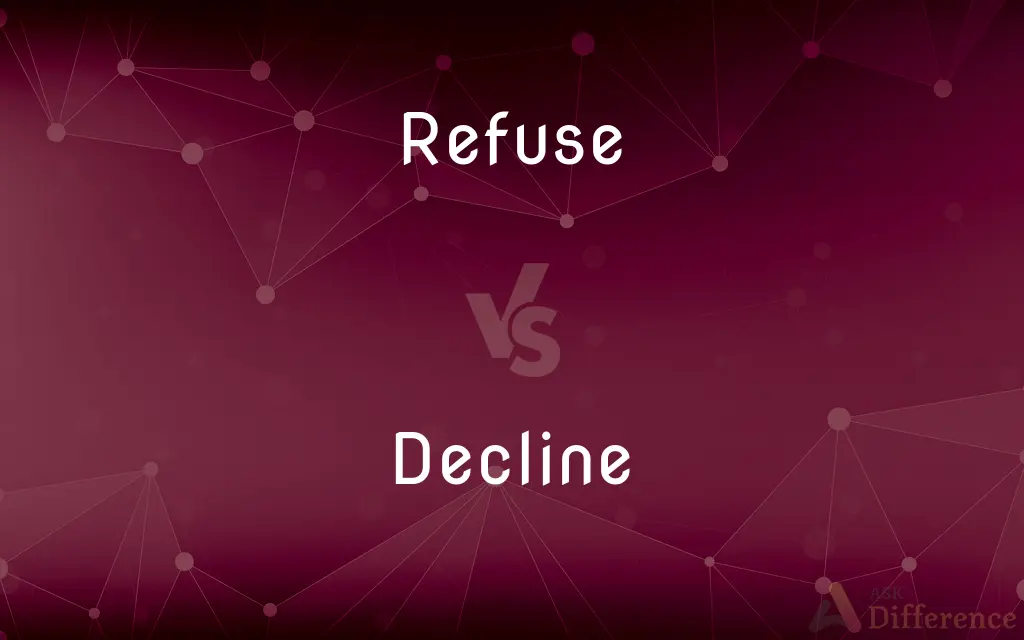Refuse vs. Decline — What's the Difference?
By Fiza Rafique & Urooj Arif — Updated on March 7, 2024
Refuse implies a firm or emphatic no, often to something undesirable, while decline suggests a polite or gentle refusal, often of an offer or invitation.

Difference Between Refuse and Decline
Table of Contents
ADVERTISEMENT
Key Differences
Refuse often conveys a strong or definitive rejection of something, typically because it is undesirable or unacceptable. This term can imply a sense of firmness or determination in the refusal. On the other hand, decline is used in contexts where the refusal is more courteous or gentle, often employed when turning down an offer, invitation, or request in a polite manner.
When someone refuses something, it can sometimes carry a negative connotation, suggesting a refusal that might be based on principle or strong objection. Whereas, declining something is generally perceived as more tactful or considerate, indicating that the decision to say no is made with politeness and respect for the other party.
Refuse can be used in both formal and informal contexts but is often associated with scenarios where the stakes are higher or the subject matter is more serious. Decline, however, is particularly common in formal or professional settings where maintaining a tone of diplomacy and civility is important.
In situations requiring a clear and unequivocal no, especially where one might want to convey opposition or disapproval, refuse is the more appropriate choice. Decline, by contrast, is suitable when the intent is to convey regret or reluctance in the refusal, often when one wishes to leave the door open for future possibilities.
The choice between refuse and decline can also reflect the nature of the relationship or interaction between the parties involved. Refusing is more direct and can be perceived as more assertive or final, while declining is softer and often used to preserve social harmony or professional relationships.
ADVERTISEMENT
Comparison Chart
Connotation
Strong or emphatic rejection; can be negative.
Polite or gentle refusal; generally positive.
Context
Both formal and informal; often used in serious matters.
Mostly formal; used in polite or diplomatic scenarios.
Tone
Firm, definitive, and sometimes harsh.
Tactful, considerate, and often regretful.
Implication
Indicates strong objection or unwillingness.
Suggests politeness, with a possible open door for the future.
Relationship
Can be more assertive or final; might affect relationships.
Preserves social or professional harmony; less likely to offend.
Compare with Definitions
Refuse
To indicate a firm or emphatic no, often due to objection or principle.
She refused to lend him the book because it was rare.
Decline
Commonly used in formal or professional settings.
She declined the interview opportunity as it conflicted with her values.
Refuse
Can be perceived as harsh or strong, depending on the context.
The activist refused to leave the site, standing firm on her principles.
Decline
To turn down politely, often an offer or invitation.
He declined the job offer due to personal reasons.
Refuse
Used in situations requiring a clear and strong rejection.
He refused to comply with the unreasonable demands.
Decline
Preferred in situations where maintaining diplomacy is important.
The diplomat declined the suggestion in a manner that preserved the relationship.
Refuse
Can be used in both personal and professional contexts.
She refused the invitation to the party due to prior commitments.
Decline
Conveys regret or reluctance in the refusal.
They declined the invitation with regret, citing scheduling conflicts.
Refuse
Often implies a definitive end to a proposal or request.
The author refused the offer to adapt his book into a movie.
Decline
Leaves room for future possibilities or goodwill.
He declined the proposal but remained open to future collaborations.
Refuse
To indicate unwillingness to do, accept, give, or allow
She was refused admittance. He refused treatment.
Decline
(typically of something regarded as good) become smaller, fewer, or less; decrease
The birth rate continued to decline
Refuse
To indicate unwillingness (to do something)
Refused to leave.
Decline
Politely refuse (an invitation or offer)
The company declined to comment
Caroline declined the coffee
Refuse
To decline to jump (an obstacle). Used of a horse.
Decline
(especially of the sun) move downwards
The sun began to creep round to the west and to decline
Refuse
To decline to do, accept, give, or allow something.
Decline
(in the grammar of Latin, Greek, and certain other languages) state the forms of (a noun, pronoun, or adjective) corresponding to case, number, and gender.
Refuse
Items or material discarded or rejected as useless or worthless; trash or rubbish.
Decline
A gradual and continuous loss of strength, numbers, quality, or value
A serious decline in bird numbers
A civilization in decline
Refuse
Discarded, rejected.
Decline
To express polite refusal
I wanted to invite them but I was afraid they would decline.
Refuse
Collectively, items or material that have been discarded; rubbish, garbage.
Decline
To slope downward; descend
The roof declines at a steep angle.
Refuse
(obsolete) refusal
Decline
To bend downward; droop
Boughs declining toward the ground.
Refuse
(transitive) To decline (a request or demand).
My request for a pay rise was refused.
Decline
To degrade or lower oneself; stoop
Refused to decline to their level of behavior.
Refuse
(intransitive) To decline a request or demand, forbear; to withhold permission.
I refuse to listen to this nonsense any more.
I asked the star if I could have her autograph, but she refused.
Decline
To deteriorate gradually; fail
His health has been declining for years.
Refuse
(military) To throw back, or cause to keep back (as the centre, a wing, or a flank), out of the regular alignment when troops are about to engage the enemy.
To refuse the right wing while the left wing attacks
Decline
To sink, as the setting sun.
Refuse
To disown.
Decline
To draw to a gradual close
We made our way home as the day declined.
Refuse
To melt again.
Decline
To refuse politely
I declined their offer of help. ].
Refuse
To deny, as a request, demand, invitation, or command; to decline to do or grant.
That never yet refused your hest.
Decline
Downward movement, fall.en
Refuse
To throw back, or cause to keep back (as the center, a wing, or a flank), out of the regular aligment when troops ar about to engage the enemy; as, to refuse the right wing while the left wing attacks.
Decline
A sloping downward, e.g. of a hill or road.en
Refuse
To decline to accept; to reject; to deny the request or petition of; as, to refuse a suitor.
The cunning workman never doth refuseThe meanest tool that he may chance to use.
Decline
A weakening.en
Refuse
To disown.
Decline
A reduction or diminution of activity.
Refuse
To deny compliance; not to comply.
Too proud to ask, too humble to refuse.
If ye refuse . . . ye shall be devoured with the sword.
Decline
The act of declining or refusing something.
Refuse
Refusal.
Decline
(intransitive) To move downwards, to fall, to drop.
The dollar has declined rapidly since 2001.
Refuse
That which is refused or rejected as useless; waste or worthless matter.
Decline
(intransitive) To become weaker or worse.
My health declined in winter.
Refuse
Refused; rejected; hence; left as unworthy of acceptance; of no value; worthless.
Everything that was vile and refuse, that they destroyed utterly.
Decline
(transitive) To bend downward; to bring down; to depress; to cause to bend, or fall.
Refuse
Food that is discarded (as from a kitchen)
Decline
(transitive) To cause to decrease or diminish.
Refuse
Show unwillingness towards;
He declined to join the group on a hike
Decline
To turn or bend aside; to deviate; to stray; to withdraw.
A line that declines from straightness
Conduct that declines from sound morals
Refuse
Refuse to accept;
He refused my offer of hospitality
Decline
(transitive) To choose not to do something; refuse, forbear, refrain.
On reflection I think I will decline your generous offer.
Refuse
Elude, especially in a baffling way;
This behavior defies explanation
Decline
To inflect for case, number, gender, and the like.
Refuse
Refuse to let have;
She denies me every pleasure
He denies her her weekly allowance
Decline
To recite all the different declined forms of (a word).
Refuse
Resist immunologically the introduction of some foreign tissue or organ;
His body rejected the liver of the donor
Decline
(by extension) To run through from first to last; to recite in order as though declining a noun.
Refuse
Refuse entrance or membership;
They turned away hundreds of fans
Black people were often rejected by country clubs
Decline
To reject a penalty against the opposing team, usually because the result of accepting it would benefit the non-penalized team less than the preceding play.
The team chose to decline the fifteen-yard penalty because their receiver had caught the ball for a thirty-yard gain.
Decline
To bend, or lean downward; to take a downward direction; to bend over or hang down, as from weakness, weariness, despondency, etc.; to condescend.
He . . . would decline even to the lowest of his family.
Disdaining to decline,Slowly he falls, amidst triumphant cries.
The ground at length became broken and declined rapidly.
Decline
To tend or draw towards a close, decay, or extinction; to tend to a less perfect state; to become diminished or impaired; to fail; to sink; to diminish; to lessen; as, the day declines; virtue declines; religion declines; business declines.
That empire must declineWhose chief support and sinews are of coin.
And presume to know . . . Who thrives, and who declines.
Decline
To turn or bend aside; to deviate; to stray; to withdraw; as, a line that declines from straightness; conduct that declines from sound morals.
Yet do I not decline from thy testimonies.
Decline
To turn away; to shun; to refuse; - the opposite of accept or consent; as, he declined, upon principle.
Decline
To bend downward; to bring down; to depress; to cause to bend, or fall.
In melancholy deep, with head declined.
And now fair Phoebus gan decline in hasteHis weary wagon to the western vale.
Decline
To cause to decrease or diminish.
He knoweth his error, but will not seek to decline it.
Decline
To put or turn aside; to turn off or away from; to refuse to undertake or comply with; reject; to shun; to avoid; as, to decline an offer; to decline a contest; he declined any participation with them.
Could IDecline this dreadful hour?
Decline
To inflect, or rehearse in order the changes of grammatical form of; as, to decline a noun or an adjective.
After the first declining of a noun and a verb.
Decline
To run through from first to last; to repeat like a schoolboy declining a noun.
Decline
A falling off; a tendency to a worse state; diminution or decay; deterioration; also, the period when a thing is tending toward extinction or a less perfect state; as, the decline of life; the decline of strength; the decline of virtue and religion.
Their fathers lived in the decline of literature.
Decline
That period of a disorder or paroxysm when the symptoms begin to abate in violence; as, the decline of a fever.
Decline
A gradual sinking and wasting away of the physical faculties; any wasting disease, esp. pulmonary consumption; as, to die of a decline.
Decline
Change toward something smaller or lower
Decline
A condition inferior to an earlier condition; a gradual falling off from a better state
Decline
A gradual decrease; as of stored charge or current
Decline
A downward slope or bend
Decline
Grow worse;
Conditions in the slum worsened
Decline
Refuse to accept;
He refused my offer of hospitality
Decline
Show unwillingness towards;
He declined to join the group on a hike
Decline
Grow smaller;
Interest in the project waned
Decline
Go down;
The roof declines here
Decline
Go down in value;
The stock market corrected
Prices slumped
Decline
Inflect for number, gender, case, etc.,
In many languages, speakers decline nouns, pronouns, and adjectives
Common Curiosities
Is there a situation where refuse and decline are interchangeable?
In some contexts, they can be used interchangeably, but the tone and implication may differ.
Can decline be used in informal settings?
Yes, but it's more common in formal contexts where politeness is paramount.
Does declining imply a reason must be given?
Not necessarily, but providing a reason can soften the refusal and maintain goodwill.
Can declining an offer affect future opportunities?
Declining politely usually preserves relationships and doesn't necessarily close the door on future opportunities.
How should I choose between refuse and decline in a professional email?
Consider the relationship and the message's tone; use "decline" for a softer, more polite refusal.
Is refusing always negative?
While refusing can have a negative connotation, it's context-dependent and not always perceived negatively.
Can cultural differences affect the perception of refuse vs. decline?
Yes, cultural norms can influence how these terms are perceived and used.
How do I refuse a task that's beyond my responsibilities at work?
Communicate clearly and respectfully, stating your reasons and possibly suggesting an alternative solution.
Is it possible to refuse politely?
Yes, tone and choice of words can convey a polite refusal even when using "refuse."
Can refusing be considered assertive?
Yes, refusing is often seen as an assertive action, especially when principles or strong objections are involved.
Is it possible to change a refusal into an acceptance later?
It can be challenging, but context and communication are key; addressing the reasons for the initial refusal can help.
Is it rude to refuse a request from a friend?
It depends on the context and how the refusal is communicated; clarity and honesty can mitigate perceived rudeness.
In negotiations, is it better to refuse or decline an offer?
"Decline" is often more suitable in negotiations, as it keeps the conversation open for counteroffers.
Can refusing be empowering?
Yes, refusing can be an act of self-assertion and empowerment, especially when it aligns with one's values or boundaries.
How can I decline an invitation without offending the host?
Express appreciation for the invitation and provide a brief, genuine reason for your inability to attend.
Share Your Discovery

Previous Comparison
Script vs. Screenplay
Next Comparison
Disability vs. ImpairmentAuthor Spotlight
Written by
Fiza RafiqueFiza Rafique is a skilled content writer at AskDifference.com, where she meticulously refines and enhances written pieces. Drawing from her vast editorial expertise, Fiza ensures clarity, accuracy, and precision in every article. Passionate about language, she continually seeks to elevate the quality of content for readers worldwide.
Co-written by
Urooj ArifUrooj is a skilled content writer at Ask Difference, known for her exceptional ability to simplify complex topics into engaging and informative content. With a passion for research and a flair for clear, concise writing, she consistently delivers articles that resonate with our diverse audience.













































